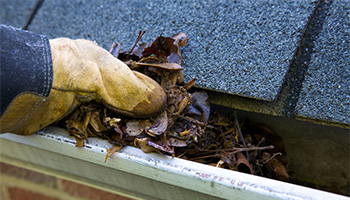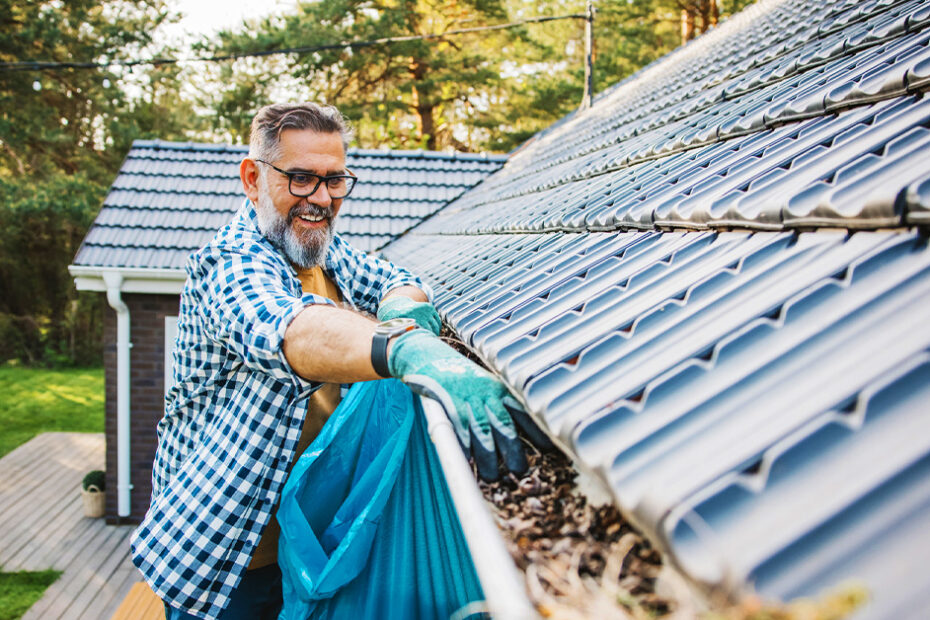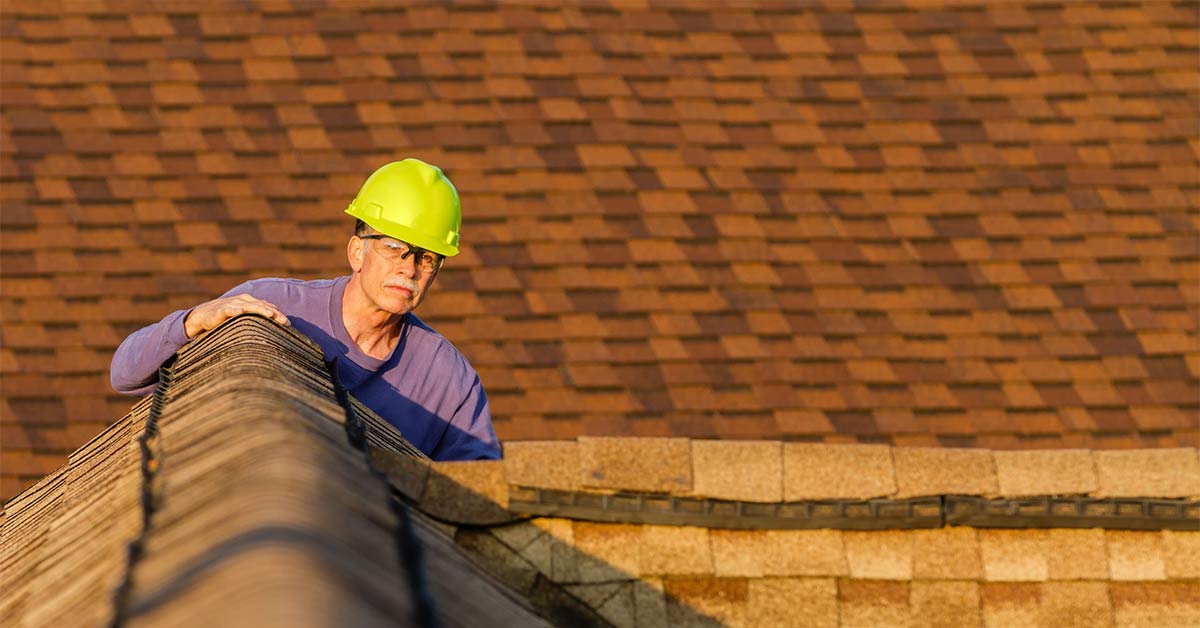As the leaves change color and temperature drop, many homeowners look forward to hosting friends and family for fall events. From cozy bonfires to indoor dinner parties, autumn is a prime season for entertaining friends and family. However, as with any seasonal change, fall presents specific challenges that can impact the safety and condition of your home. Properly preparing your home for fall can help mitigate risks, reduce potential claims, and protect your investment. Here are four key safety tips and maintenance checks any homeowner can use to keep their home safe this autumn.
1. Outdoor Safety and Maintenance
Cooler weather encourages outdoor gatherings, but fall can bring its share of hazards depending on your location. Wet leaves, shorter daylight hours, and cooler temperatures can all contribute to accidents if homes aren’t adequately prepared. Here are some critical safety checks to perform outside your home when preparing for fall:
Clean Out Your Gutters and Downspouts

When leaves fall, they can clog gutters and downspouts, preventing water from properly draining away from your home. As temperatures dip, this can lead to water damage, basement flooding, or ice dampness. Clean your gutters regularly during the fall and inspect them for damage. Look for cracks, loose brackets, or any areas obstructing water flows.
Tip: Consider installing gutter guards to minimize debris buildup. Well-maintained gutters protect your home from water damage and reduce the likelihood of claims related to water infiltration.
Rake leaves and Clear Walkways
When wet, fallen leaves create slippery surfaces that can lead to slips and falls. Rake your yard regularly and ensure that walkways, driveways, and steps are free of leaves and other debris. Clear these paths before guests arrive to reduce the risks of accidents, which could lead to liability claims.
Tip: Pay extra attention to uneven or cracked pathways. If repairs are necessary, take care of them before the first frost to prevent further damage or potential injury.
Lighting and Visibility
As the days grow shorter, adequate lighting around your home becomes more important. When preparing your home for fall, ensure all outdoor lighting works properly, especially around walkways, driveways, and entrances. Install motion-sensor lights or additional lighting if your property’s areas remain dark in the evening.
Good lighting enhances your guests’ safety and can deter potential break-ins, which may reduce the likelihood of filing a home burglary.
Fire Pit and Bonfire Safety

Fall is synonymous with cozy bonfires and firepits, but these come with inherent risks. Before lighting any outdoor fire, ensure your fire pit or bonfire area is at a safe distance from your home, trees, and other structures. Ensure that firewood and combustible materials are stored far away from fire sources, and always have a fire extinguisher or bucket of water nearby in case of emergencies.
Tip: Check your homeowners’ insurance policy to understand your coverage for fire-related incidents. While outdoor fires are a great way to entertain guests, fire safety must be a priority to avoid potential damages and insurance claims.
2. Indoor Safety and Maintainance
Indoor hosting during the fall season offers guests a warm and inviting environment. However, with the transition from summer to fall, certain safety concerns could affect your home and its occupants. Addressing these risks with a few essential maintenance checks while preparing your home for fall can safeguard your property and those inside it.
Heating System Maintenance
As temperatures cool down, homeowners start relying more on heating systems. Whether your home uses a fireplace or space heaters, ensuring these systems are in good working condition is essential to prevent malfunctions, fires, or carbon monoxide poisoning.
Schedule a professional HVAC inspection to check for leaks, clogged filters, or other issues. If you use a fireplace, have it cleaned by a certified chimney sweep to remove creosote buildup and reduce the risk of chimney fires.
Tip: Ensure your home is equipped with working smoke and carbon monoxide detectors in all appropriate areas. These devices should be tested monthly, and their batteries should be replaced at least once a year.
Electrical Safety
With more time spent indoors, lighting, appliances, and other electronics are used more during fall. Ensure that your electrical system is safe and up to code. Avoid overloading outlets or extension cords, and check that all your electrical wiring is in good condition. If you notice flickering lights or frequently tripped breakers, consult a licensed electrician before hosting any events.
Tip: Fires caused by faulty electrical wiring or overloaded circuits are a common cause of home insurance claims. Preventing electrical fires protects your home and guests and may reduce your insurance premiums if upgrades are made to an outdated system.
Slip and Fall Prevention
As guests move between indoor and outdoor spaces, the risk of slips and falls increases, particularly if wet weather or damp leaves make their way inside. Placing non-slip mats at entry points can help reduce the tracking of water and leaves into the house. Always keep stairways well-lit and ensure that any loose handrails are repaired before inviting guests over.
Rugs inside the home should be properly secured with nonslip pads to avoid tripping hazards, especially in high-traffic areas like the kitchen and living room.
Kitchen Safety and Fire Prevention

The kitchen is often the hub of indoor entertaining, especially during fall holidays. Cooking fires are a common cause of home insurance claims, making kitchen safety a top priority when preparing meals for gatherings.
Never leave cooking unattended, especially when using the stove or oven. Keep flammable items, like dish towels and paper products, away from heat sources, and make sure fire extinguishers are easily accessible.
Tip: If you’re deep-frying foods such as chicken or using large cooking appliances like an oven when cooking lobster, be aware of the risks of grease fires. Make sure to have a plan in place for dealing with fires and review your home insurance policy to understand the coverage for kitchen-related damages.
3. Hosting Liability Considerations
In addition to maintaining the safety of your home, it’s important to consider the liability risks associated with hosting guests. Homeowner’s insurance typically includes liability coverage, which can protect you if someone is injured on your property or you’re found responsible for property damage. However, understanding your policy limits and exclusions is crucial for ensuring you’re adequately covered.
Alcohol and Liability
If you plan to serve alcohol at your fall gatherings, be aware of the legal and financial risks associated with overconsumption. In some states, homeowners can be held liable if guests leave intoxicated and cause an accident or injury.
Limit alcohol consumption during gatherings and offer nonalcoholic options. Encourage guests to arrange for transportation to use rideshare services if they plan to drink.
Tip: Speak with your insurance provider about the specifics of your liability coverage for alcohol-related incidents. You may want to consider umbrella insurance, which provides an extra layer of protection in case of lawsuits or large claims.
Children and Pets
If children or pets are expected to attend your event, take extra precautions to host a safe environment. Make sure pools, fire pits, and potentially hazardous areas are off-limits and properly supervised. Install barriers or gates where necessary to keep children and pets safe.
Proper liability coverage is a good precaution in case a guest’s child or pet is injured while on your property. Knowing your homeowners’ insurance policy includes these protections can give you peace of mind as a host.
4. Reviewing Your Insurance Policy
Before the fall season begins, it’s a good idea to review your homeowners’ insurance policy to ensure you have adequate coverage for the increased risks associated with hosting an event. This is especially important if you’re planning large gatherings or making significant changes to your property, such as installing a new fire pit or removing an outdoor space.
Key Aspects of Your Policy to Review
Liability Coverage
Verify that your policy’s liability coverage is sufficient to protect you in case of an accident or injury on your property. Typical policies provide liability coverage between $100,000 and $500,00, but you may want to increase this if you frequently host guests.
Personal Property Coverage
Fall gatherings often involve valuable items like outdoor furniture, decorations, or cooking equipment. Ensure that your personal property is adequately covered in case of theft or damage.
Exclusions
Review any exclusions in your policy to understand what isn’t covered, particularly when it comes to outdoor features like fire pits, swimming pools, or trampolines. Consider speaking with your insurance agent about adding endorsements or riders to your policy to cover additional risks, such as increased liability or specific types of property damage.
Conclusion
Fall is a wonderful time for entertaining, but it also presents specific safety challenges. Host worry-free gatherings while minimizing risks by preparing your home for fall with a few proactive steps, such as ensuring proper maintenance, addressing potential hazards, and reviewing your insurance coverage.
Whether you’re a homeowner or an insurance professional advising clients, these safety tips and maintenance checks will help ensure that fall entertaining is enjoyable and secure. A well-prepared home safeguards your guests and protects you from unnecessary claims and liabilities. To learn more about how AIS can help you secure coverage, give us a call at (888) 772-4247, or start a quote online.
Guest blog written by Benjamin Grennan. The information in this article is obtained from various sources and offered for educational purposes only. Furthermore, it should not replace the advice of a qualified professional. The definitions, terms, and coverage in a given policy may be different than those suggested here. No warranty or appropriateness for a specific purpose is expressed or implied. The opinions expressed by guest bloggers are theirs alone and do not reflect the opinions of AIS Management LLC, any subsidiary or affiliate of the same, or any employee thereof. We are not responsible for the accuracy of any of the information supplied by the guest bloggers.


